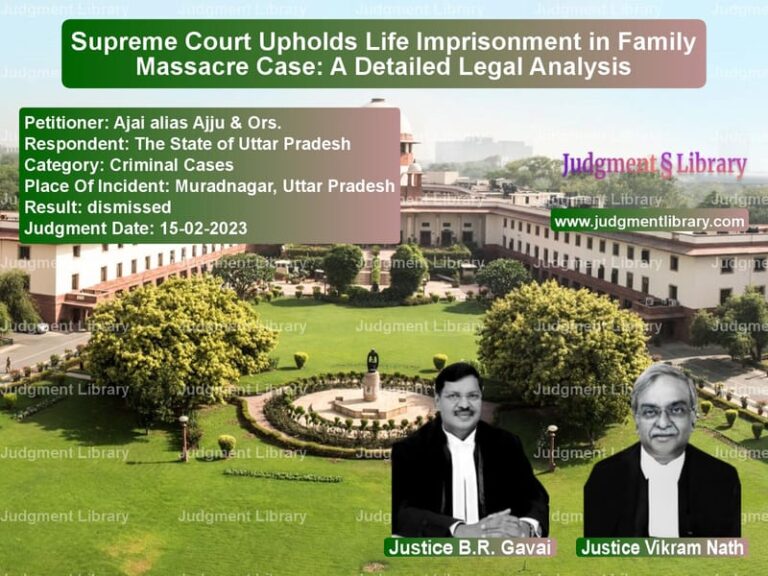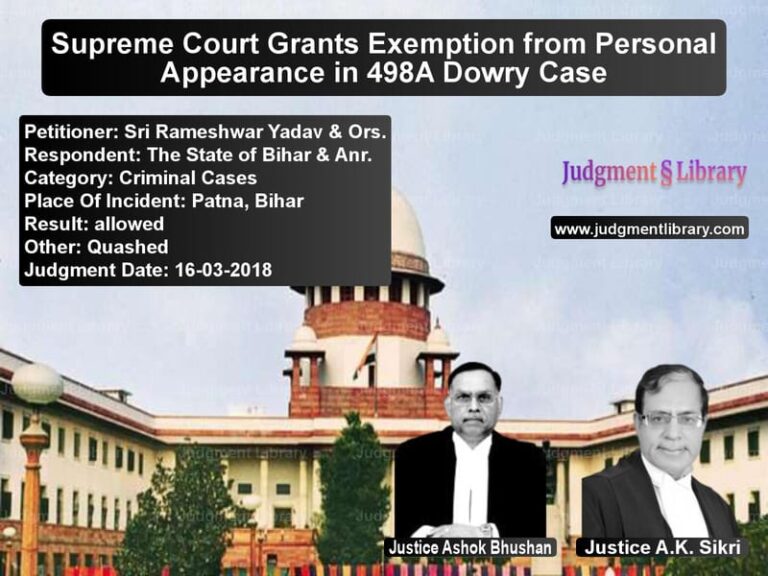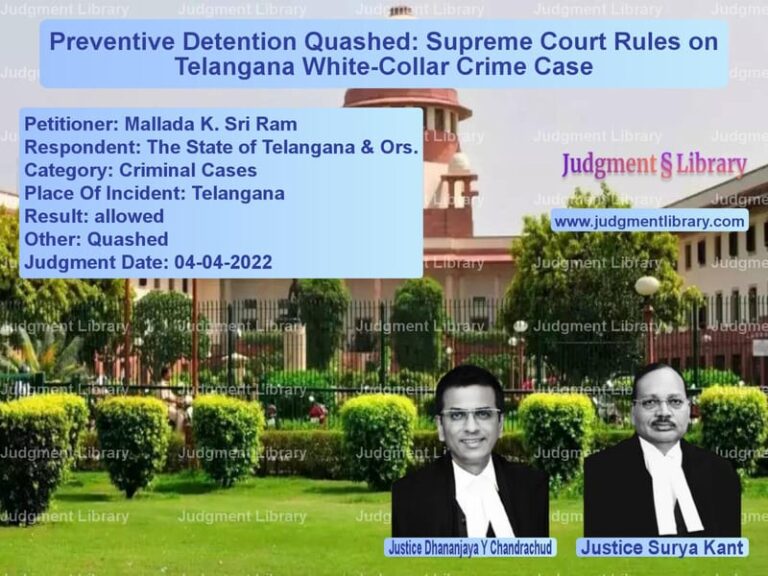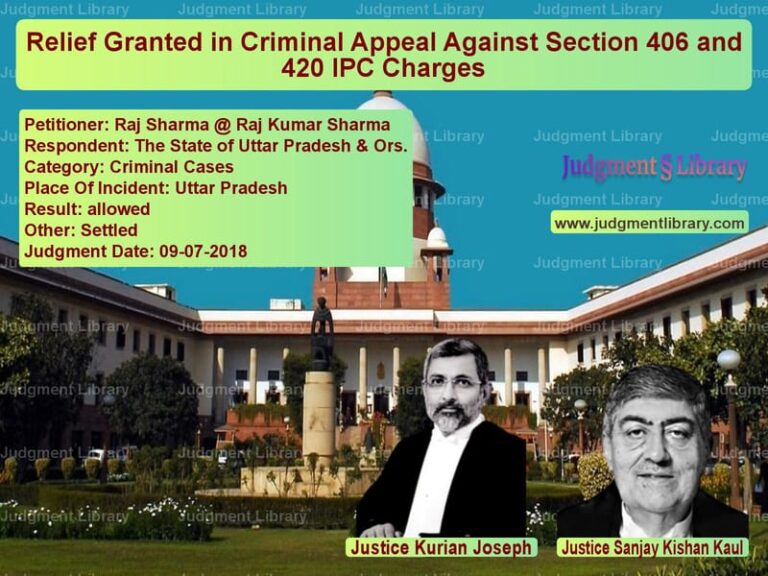Supreme Court Quashes Land Acquisition for Trinity House Building Society
The case of R. Rajashekar & Ors. v. Trinity House Building Co-operative Society & Ors. revolves around the land acquisition proceedings for a housing cooperative society in Karnataka. The Supreme Court quashed the acquisition, citing procedural irregularities and the role of middlemen in influencing the government.
Background of the Case
The dispute arose from the acquisition of agricultural lands in Avalahalli and Herohalli villages for Trinity House Building Co-operative Society. The society was registered on 09.01.1984 with the objective of providing residential sites to its members. However, landowners challenged the acquisition, arguing that it was influenced by middlemen and did not serve a legitimate public purpose.
Key Legal Issues
- Was the land acquisition for a public purpose under Section 3(f)(vi) of the Land Acquisition Act, 1894?
- Did the acquisition process follow due legal procedures?
- Was the role of middlemen in securing government approvals lawful?
- Should the sale transactions executed during the litigation period be recognized?
Arguments from the Appellants (Landowners and Purchasers)
- The appellants argued that the acquisition was influenced by a private real estate agent, Mr. S. Rangarajan, who acted as a middleman between the society and the government.
- They contended that no proper housing scheme was framed or approved by the state government as required under Section 3(f)(vi) of the Land Acquisition Act.
- They claimed that the acquisition notifications were issued as a result of extraneous considerations rather than genuine public interest.
- The appellants also challenged the sale transactions executed by Mr. Rangarajan during the litigation, arguing that they were fraudulent and void.
Arguments from the Respondents (Trinity House Building Co-operative Society)
- The society argued that the acquisition was approved by the State Level Coordination Committee and followed due process.
- They contended that the acquisition was for a legitimate public purpose, as it aimed to provide housing for its members.
- The society relied on the state government’s approval letter dated 26.11.1987, which authorized the acquisition.
- They also argued that the landowners had voluntarily transferred power of attorney to Mr. Rangarajan, giving him the authority to facilitate the acquisition.
Supreme Court’s Judgment
1. No Valid Public Purpose Under Section 3(f)(vi) of the Land Acquisition Act
The Court ruled that the acquisition did not qualify as a public purpose because:
- No housing scheme was framed and approved by the state government before the acquisition.
- The involvement of a private middleman in securing government approvals indicated an improper exercise of state power.
- The government did not independently assess the necessity of the acquisition.
The judgment observed:
“The concept of hiring middlemen to get lands of poor agricultural workers acquired by the state government in favor of a cooperative society is abhorrent and cannot be granted the sanction of law.”
2. Role of Middlemen Rendered the Acquisition Invalid
The Court found that Mr. S. Rangarajan acted as an intermediary, negotiating land deals and securing government approvals in exchange for monetary compensation. This violated the principles of fair and transparent land acquisition.
3. Sale Transactions During Litigation Were Fraudulent
The Court ruled that the sale transactions executed by Mr. Rangarajan in favor of his family members during the litigation period were fraudulent and void. It noted:
“The transactions of the alleged sales made during the pendency of the proceedings are wholly illegal and void ab initio in law.”
4. Quashing of Acquisition Proceedings
The Court quashed the land acquisition notifications issued under Sections 4(1) and 6(1) of the Land Acquisition Act, restoring the ownership of the original landowners.
Key Takeaways from the Judgment
- Land acquisition must serve a genuine public purpose and cannot be influenced by private intermediaries.
- The government must independently assess the necessity of acquiring land and ensure compliance with legal requirements.
- Sale transactions executed during litigation, particularly by individuals acting as middlemen, are not legally valid.
- Cooperative societies must follow due legal procedures, including obtaining prior government approval, before seeking land acquisition.
Conclusion
The Supreme Court’s decision in R. Rajashekar & Ors. v. Trinity House Building Co-operative Society & Ors. reinforces the importance of transparency in land acquisition. By striking down the acquisition, the Court upheld the rights of landowners and set a precedent against private influence in state-led acquisitions.
Don’t miss out on the full details! Download the complete judgment in PDF format below and gain valuable insights instantly!
Download Judgment: R. Rajashekar & Ors. vs Trinity House Buildi Supreme Court of India Judgment Dated 15-09-2016-1741883726152.pdf
Direct Downlaod Judgment: Direct downlaod this Judgment
See all petitions in Property Disputes
See all petitions in Landlord-Tenant Disputes
See all petitions in Contract Disputes
See all petitions in Judgment by V. Gopala Gowda
See all petitions in Judgment by Adarsh Kumar Goel
See all petitions in allowed
See all petitions in Quashed
See all petitions in supreme court of India judgments September 2016
See all petitions in 2016 judgments
See all posts in Civil Cases Category
See all allowed petitions in Civil Cases Category
See all Dismissed petitions in Civil Cases Category
See all partially allowed petitions in Civil Cases Category







